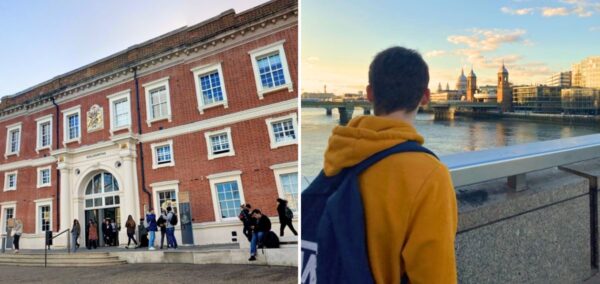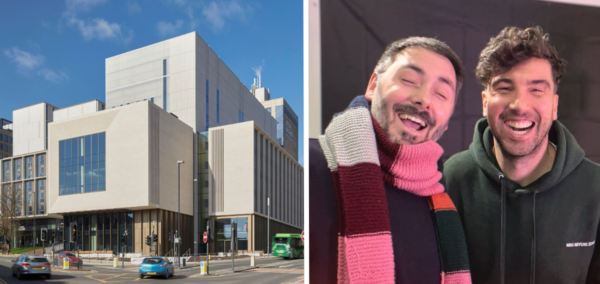
Only least privileged students accepted to study law at Edinburgh University
Some have applauded the university for helping to ‘break poverty cycles’
Edinburgh University chose to only accept students from deprived backgrounds to study certain subjects in 2022, figures show.
Of 1,205 applicants to study law, 555 were deemed to be from more advantaged backgrounds, whereas 650 were from deprived areas of the country or underperforming schools. 170 students from deprived backgrounds were accepted, while none from more wealthy backgrounds were offered a place.
The figures were obtained by Labour MSP Michael Marra, who told The Scotsman newspaper of his disappointment at the findings: “We now have hundreds of ordinary young Scots applying to our top universities who in reality have no chance of getting in”.
“A basic principle of a Scottish education is now being breached. You study hard, you get the good grades you deserve and you get into university”.
The University of Edinburgh said it is making a sustained effort to ensure meaningful social mobility is achieved, but that the number of students it can accept from Scotland is capped by the government, because it funds free tuition for Scottish students.
Despite criticism of the university, others have applauded the revelations. Vonnie Sandlan, the former president of NUS Scotland, wrote on Twitter that: “More students enrolling from state schools with low progression rates to uni, and students coming from poorer household income families is A GOOD THING”.
The university uses a flagging system to ensure those from more deprived backgrounds are offered places. Applicants who come from an area in the top 40% most deprived parts of Scotland, or a school with low attainment, are given a flag. A “plus flag” is given to particularly disadvantaged students including refugees, who are virtually guaranteed a place to study.
In 2022, no students without a flag were offered a place to study law at the University of Edinburgh, the BBC reports.
Labour MSP @michaeljmarra says he has obtained data showing that Edinburgh University accepted no Scottish students on a number of courses outside of widening access places.
"For Scottish pupils from ordinary families in an average school, the doors are closed…" pic.twitter.com/BjxW2Ed7ZY
— Holyrood magazine (@HolyroodDaily) January 12, 2023
Mr Marra, who is Scottish Labour’s education spokesperson, blames the trend on the SNP’s funding of education for Scottish students.
“For thirteen years the SNP have refused to increase the resource paid to universities for educating Scottish students”, he said, adding that a system which “excludes” some children could be considered unfair by some taxpayers.
In Scotland, Scottish students are able to attend university for free, however, the Scottish government places a cap on the number of young people universities are able to accept using their funding.
In a statement to the Edinburgh Tab, the Scottish government’s Higher Education Minister, Jamie Hepburn, emphasised the government’s policy of free tuition for Scottish students means student loan debt in Scotland is the lowest in the UK.
“Since 2006-07, the number of Scottish-domiciled full-time first degree entrants has increased by almost 30%, to over 33,000 in 2020-21”, he continued.
Or: Edinburgh University finally rebalancing on fair access to post-compulsory education.
More students enrolling from state schools with low progression rates to uni, and students coming from poorer household income families is A GOOD THING. That’s how you break poverty cycles https://t.co/gACU7iSyRI
— Vonnie Sandlan (@VonnSand) January 12, 2023
The Scotsman newspaper, in which the Labour MSP originally wrote about his findings, has called the trend “an extraordinary act of injustice”.
Labour MSP, Michael Marra, said: “The SNP have broken the promise of a Scottish education by closing the doors of our universities to whole swathes of young Scots.
“A basic principle of a Scottish education is now being breached. You study hard, you get the good grades you deserve and you get into university. With that comes the life changing opportunities that flow from your efforts. It is a promise of hard work and fairness and it is being betrayed by the SNP.
“We now have hundreds of ordinary young Scots applying to our top universities who in reality have no chance of getting in. The door is closed. These institutions still receive billions of pounds of tax payers money. Those taxpayers will rightly ask whether a system that excludes their children is a fair one.
“The business model imposed by the SNP has broken the promise of a Scottish education. Any attempt to hide these failures behind widening access programmes is deceitful and can only undermine that vital work. Recent progress in Widening Access programmes from a historically low base is not the reason why Universities are closing courses to many ordinary young Scots.
“For thirteen years the SNP have refused to increase the resource paid to universities for educating Scottish students. The folly of that decision will only be exacerbated by current inflationary pressures to which the Scottish Government has singularly failed to respond. Capping Scottish student numbers is shutting too many out of the chance of a better future here in Scotland. ”
A spokesperson for the University of Edinburgh said: “We take our commitment to widening access very seriously and recognise that a long term and sustained effort is required to achieve meaningful social mobility in communities. More than 80 per cent of our entrants from Scotland consistently come from a state school and the proportion of students from Scotland’s most disadvantaged areas has almost doubled since 2015.
“The number of students we can accept from Scotland is capped by the Scottish Government, which means that applicants are only in competition with those who are also within their own fee pool i.e. Scotland, Rest of UK and international. This means that the number of places for international students has no bearing on the number of places available to students from Scotland or the rest of the UK.”
Scottish Higher Education Minister Jamie Hepburn said: “Since 2006-07, the number of Scottish-domiciled full-time first degree entrants has increased by almost 30%, to over 33,000 in 2020-21.
“UCAS data from last month shows a record number of 18-year-old Scots secured a place at our world-class universities in 2022.
“Our commitment to free tuition means that, unlike elsewhere in the UK, Scottish-domiciled students studying in Scotland do not incur additional debt of up to £27,750, and average student loan debt in Scotland is the lowest in the UK.”
Related stories recommended by this writer:
• Edinburgh University staff to strike for 18 days between February and March
• Over a fifth of Edinburgh students say they are addicted to Elf Bars
• ‘To commit no flatcest’: The 19 most relatable New Year’s resolutions from Edi students




















